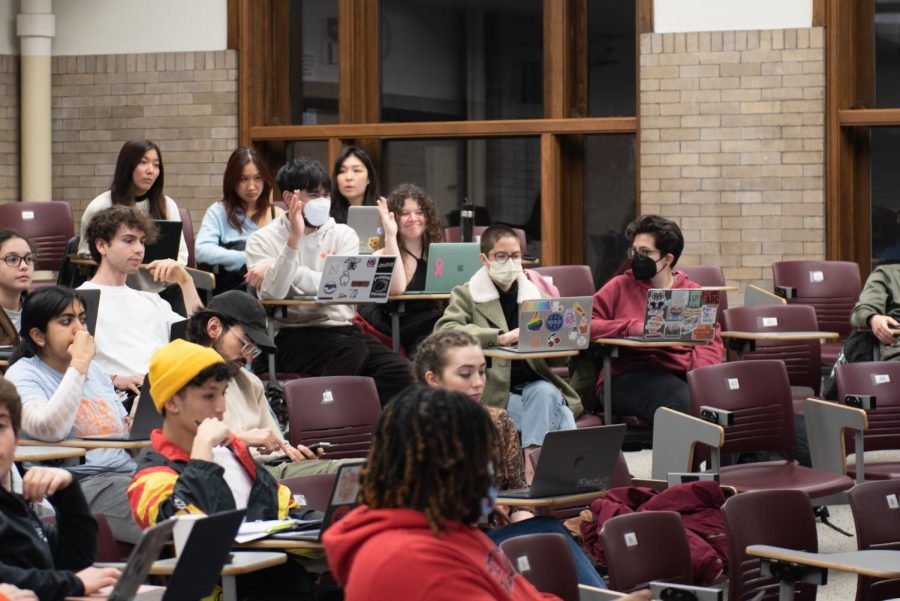ASG Senate passes two resolutions, proposes ending weekly meetings
Katie Chen/The Daily Northwestern
ASG Senate leadership also announced a proposal Wednesday that would end weekly meetings and open the Senate floor to constituents who wish to voice concerns.
January 19, 2023
The Associated Student Government Senate passed two resolutions Wednesday calling on the University to grant department status to two Council of Race and Ethnic Studies programs and shift Peer-Guided Study Group registration times. The Senate leadership also proposed legislation to eliminate weekly meetings.
The first resolution, authored by Alianza Senator and Weinberg sophomore Nicole Aguilar-Medina and SESP Senator and sophomore Anna Alava, asked for the University to grant department status for the Latina and Latino Studies and Asian American Studies programs. The resolution passed unanimously.
“The issue speaks for itself,” Alava said. “It’s something that students have wanted for a long time.”
She said the movement to departmentalize the two programs is popular on campus.
Alava added, however, that she and Aguilar-Medina must now persuade the University administration to implement the reform.
“Long-term, it will take a lot more student action and faculty support for this to be (enacted),” Alava said. “Faculty have already drafted proposals for departmentalization many times before.”
Aguilar-Medina agreed and said that as Northwestern culture becomes more inclusive, ignoring both programs’ efforts to achieve increased legitimacy would be “problematic.”
She also said this bill’s unanimous passage speaks to the due diligence and research she and Alava did before bringing the legislation to the Senate floor.
“Our particular piece of legislation had more (supporting) history that was hard to dispute,” Aguilar-Medina said.
The second resolution discussed, addressing Peer-Guided Study Group registration accessibility, also passed unanimously, but the Senate debated an amendment to the bill.
The amendment suggested changing Houren’s proposed time to 8 a.m.
Weinberg Senator and freshman Grace Houren, who authored the legislation, initially proposed the registration time be switched from midnight to noon.
“A lot of people realize that, like I said last week, there isn’t one time that’s going to work for everyone,” Houren said.
The amendment was unanimously rejected after debate.
At the end of the meeting, ASG Senate leadership announced a proposal that would end weekly meetings, among other reforms, like opening the Senate floor to constituents who wish to voice concerns. If implemented, the proposal would also introduce “work weeks” to the Senate schedule, which would encourage legislation drafting and communication with the executive board, according to Senate Parliamentarian and SESP junior Dalia Segal-Miller.
Deputy Speaker of the Senate and SESP junior Leah Ryzenman said Senate leadership has discussed restructuring Senate operations and order for years, but this would be the first major reform to the body in recent years.
ASG President and Weinberg senior Jason Hegelmeyer said the ASG Executive Board is always trying to make the Senate more effective, which the new senate order proposal aims to do.
“This is a great way to be more efficient with everyone’s time and make legislation that’s impactful,” Hegelmeyer said.
Email: [email protected]
Twitter: @JulianAndreone
Related Stories:
— ASG Senate discusses reforms for Ethnic Studies programs, Peer-Guided Study Group registration times
— ASG leadership details Winter Quarter legislative agenda, goals
— ASG Senate kicks off Winter Quarter with changes to internal rules


